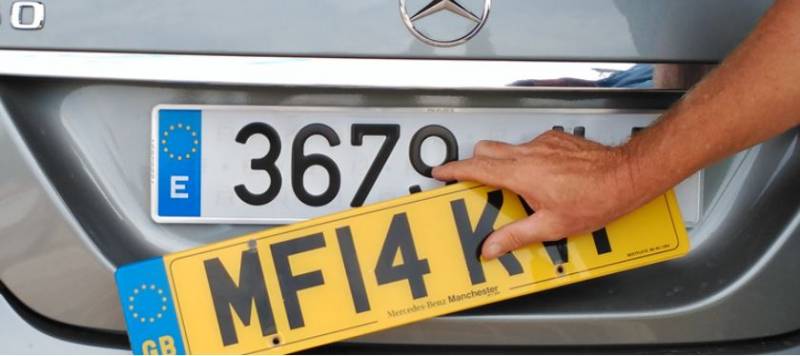Common Challenges Dealt With During Foreign Automobile Registrations and Just How to Overcome Them
Browsing the intricacies of international vehicle registrations can be a difficult job, laden with obstacles that differ significantly across jurisdictions. Issues such as figuring out regional guidelines, getting rid of language obstacles in crucial documents, and integrating disparities in lorry requirements usually emerge. Moreover, understanding tax obligation effects and compliance with security requirements can even more complicate the process. By examining reliable approaches to attend to these challenges, individuals can much better place themselves for a smoother enrollment experience. The concern stays: what particular steps can be taken to reduce these common challenges?

Comprehending Regional Regulations
Browsing the complexities of foreign lorry registration begins with a detailed understanding of regional policies. Each nation has its certain laws and needs regulating the registration of vehicles, which can differ considerably from one territory to an additional (Register a foreign Vehicle in Spain). It is important for foreign lorry owners to acquaint themselves with these guidelines to make sure compliance and stay clear of potential penalties or legal difficulties

Moreover, some territories mandate vehicle inspections to determine compliance with neighborhood safety and exhausts criteria. This could demand alterations to the lorry prior to it can be legitimately registered. Engaging with regional authorities or seeking advice from with legal experts can supply clarity on these laws.
Language Obstacles in Documents
Language obstacles position significant difficulties when it involves the documents required for foreign vehicle registration. Numerous individuals experience problems in comprehending the particular requirements described in regional policies, as these documents are often released in the main language of the host nation. Misinterpretations can lead to the entry of inaccurate or insufficient documents, leading to hold-ups or denial of registration.
Furthermore, important papers, such as title acts, evidence of ownership, and insurance plan, may not have conveniently available translations - Register a foreign Vehicle in Spain. This can produce complication for international car proprietors who are strange with the local terminology and lawful lingo. Therefore, navigating the registration procedure ends up being difficult, typically requiring added effort and time to make certain conformity
To reduce these issues, it is suggested for foreign vehicle owners to seek professional translation services or seek advice from regional experts who can assist in comprehending the requisite documentation. Additionally, government agencies may provide multilingual resources or guidelines to promote the enrollment process. Proactively dealing with language barriers can enhance the enrollment experience, ensuring that all required records are precisely ready and sent based on local policies.
Lorry Requirements Disparities

Encountering vehicle spec inconsistencies can create considerable obstacles for international automobile owners during the enrollment procedure. These inconsistencies typically occur from differences in producing standards, measurement systems, and governing needs between the vehicle's country of Check Out Your URL origin and the host nation. For example, a car that meets safety and exhausts criteria in one nation might not straighten with the specifications needed for registration in an additional, resulting in delays or straight-out denials.
To overcome these challenges, it is critical for foreign automobile proprietors to conduct complete research study prior to initiating the enrollment process. This consists of recognizing the details needs established by the regional authorities, such as security criteria, emissions degrees, and any necessary modifications. Engaging with an expert solution focusing on foreign lorry enrollment can likewise offer valuable understandings and help in navigating these discrepancies.
Paperwork plays a vital duty, so making certain that all technological specifications and adjustments are accurately mirrored in the documentation can reduce problems. Furthermore, keeping open interaction with neighborhood registration authorities can offer quality on any prospective disparities, allowing for timely resolution and effective enrollment of the car.
Browsing Tax Obligation Requirements
Comprehending the tax obligation requirements connected with international lorry enrollment is necessary for proprietors seeking to follow neighborhood guidelines. Each jurisdiction has details tax obligations that have to be satisfied before a car can be lawfully signed up. These may include import tasks, value-added taxes (BARREL), and yearly lorry tax obligations, which can differ substantially depending on the vehicle's origin, value, and specifications.
To navigate these tax requirements efficiently, car proprietors need to start by researching the certain tax obligations applicable in their location. Consulting with local tax authorities or a tax obligation specialist with experience in international automobile enrollments can supply clearness on the process and possible liabilities.
In addition, it is critical to preserve thorough documents of the vehicle's acquisition and any payments made, as this will be required for tax obligation computations and potential audits. Owners need to also be conscious of any kind of deadlines connected with tax repayments to prevent fines or hold-ups in registration.
Examination and Compliance Issues
Regularly addressing assessment and conformity concerns is important for owners of foreign cars seeking to register them in a brand-new territory. Each area has distinctive regulations concerning automobile safety and security, exhausts, and modifications, which can position substantial difficulties for owners not familiar with local criteria. Therefore, comprehending these requirements is essential to check out this site stay clear of hold-ups and additional costs.
One typical issue arises when foreign automobiles do not fulfill the host jurisdiction's security and discharges criteria. Owners need to proactively validate that their cars comply with regional guidelines, which may include alterations or obtaining needed paperwork from producers. In addition, numerous jurisdictions call for a comprehensive assessment by an authorized center, which can lead to additional difficulties if the car fails to satisfy specific standards.
To browse these obstacles, owners can get in touch with neighborhood lorry registration authorities or seek assistance from professionals acquainted with the registration process. Preparing all required you could check here documentation ahead of time, including previous examination records and proof of conformity, can simplify the registration process. Eventually, complete preparation and understanding of assessment demands can substantially improve the probability of a successful international vehicle enrollment.
Conclusion
In recap, the process of foreign automobile registration entails numerous difficulties, consisting of comprehension of local laws, language barriers in documentation, inconsistencies in car specifications, navigating of tax obligation needs, and assessment and compliance issues. Addressing these difficulties demands thorough research, utilization of specialist translation services, and assessment with regional authorities. Involving specialized solutions can make sure adherence to safety and security and discharges requirements, inevitably promoting a smoother enrollment procedure and compliance with all relevant responsibilities.